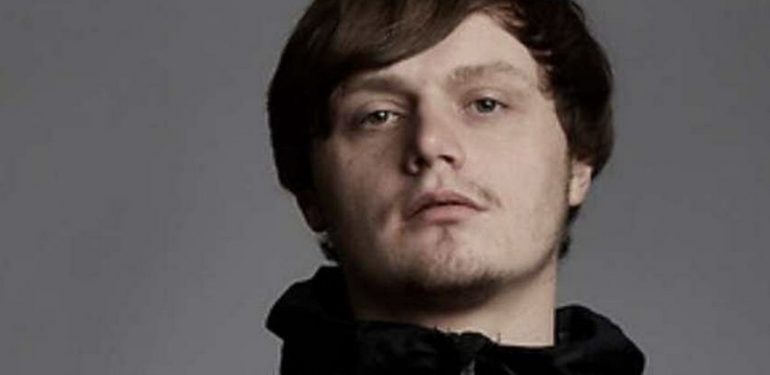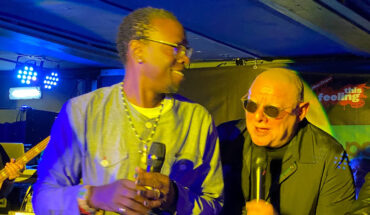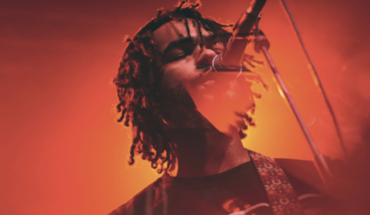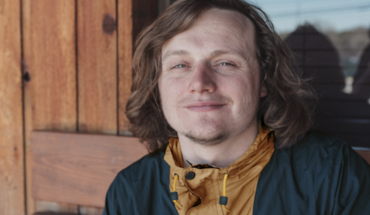The definition of a DIY success and how to create your own buzz, Jamie Webster smashed it in Liverpool by playing shows before LFC games to fans hungry for extra excitement. Taking that energy to the world with his electric debut album We Get By, caps Jamie’s phenomenal rise. But the voice of working-class attitude needed grit in taking a decade to get to the top. He tells This Feeling why it’s important musicians know what real life is and how he’s taken the graft learned as an electrician into the studio…
One of the many ways the music industry is obviously messed up is how it treats anyone who’s grafted for a living as a novelty. By now, you probably know that Jamie Webster worked as an electrician for nine years before becoming a full-time musician. Now that Jamie is flying, with his sensational debut album We Get By set to storm into the chart this week, his background is treated as something exotic by many people in music, who don’t quite know what to do with a working-class lad who’s lived a life before making music.
“I’ve got nothing but respect for people who went to music college because they knew what they wanted to do their whole life,” insists Jamie. “At the same time, you’ve got to sample the world a little. I’m 26 now, and I’ll be stratospherically lucky to do this for another 15 years. I’ll still tour once a year, playing to maybe 300 people, but you need a life otherwise you’ll be empty at 40.”
Jamie isn’t at all chippy about being an outsider for how he’s broken into the music industry. Speaking to TF from his studio in Liverpool, he’s buzzing, funny and fizzing with ideas 24/7. Jamie’s thoughts spill out, spinning wisdom while talking quicker than pretty much any musician TF has ever met. He’s every bit as sound as you’d hope from his music.
“I just want people to relate to my music,” he explains. “I want to bring as many people as possible together, through shared experiences. I want to make people feel together in this life we live. I’m from Liverpool and so are all my mates. But I make music that I hope will appeal to working-class people in Manchester, Newcastle, Glasgow, down south… We all have the same kind of life and the same dreams. If you strip it back, the only difference is your accent.”
That idealism is shot through We Get By, whipsmart lyrics and crackling riffs combining into anthems perfect for hollering along to with your mates as loudly as possible. “When I was playing covers in bars, I’d have everyone sing along to Don’t Look Back In Anger, thinking ‘Wow, imagine how good that’d feel if you’ve written the song’,” Jamie recalls. It happened for the first time when he played his debut single Weekend In Paradise at his first headline show, at Liverpool’s legendary starter venue Zanzibar. “Hearing people sing my songs back is bigger than any chart position,” he insists. “The numbers in the chart, that’s a target I’ve got to reach, but that’s not why I’m in it. Any tag like ‘The wordsmith of his generation’ doesn’t mean bollocks to me. The silver lining is all those nights in sweaty venues when everyone is going for it.”
It’s significant that Jamie talks about targets. He takes the work ethic from his electrician years into the studio, where he works 12pm-8pm every day. “I’ve enjoyed every single day being a full-time musician, because I know what the alternative is,” he laughs. “Eighteen months ago, I’d be driving to Manchester in the freezing rain to sort the electrics out on a horrible site, taking shit from the people above me. It gave me a trade, it paid for my lifestyle of following Liverpool everywhere and I had a laugh with the fellers on site. But it wasn’t enjoyable. It wasn’t like I’d wake up every morning thinking ‘I can’t wait to replace this fuse board!’ I’d be thinking ‘There’s got to be more to life than this.’ Now, I wake up and wonder what songs I can write today. Every day is new.”https://www.youtube.com/embed/IWaqyIV5N7Q?wmode=opaque&enablejsapi=1
Jamie’s appreciation of his new lifestyle was cemented by advice from Timo Tierney, singer with fellow Liverpool heroes The Tea Street Band. Recommending Jamie sign with local label Modern Sky – also home to Red Rum Club, The Lathums, No Hot Ashes, Slow Readers Club and Calva Louise – Timo also urged Jamie to enjoy himself and savour every moment, not to take it for granted. You sense it’s unlikely Jamie was in danger of doing any different, but having a mentor like Timo has definitely helped. Jamie is also friends with local peers including Rats, Peachfuzz and The Sway, while city legends such as Ian McCulloch, James Skelly and Ian Broudie have also backed him. And of course Jamie wrote the epic This Place in honour of Liverpool. He wants to take the euphoria of his hometown shows to the rest of the world too. “The support I’ve had from the city and from Liverpool as a club has given me the platform for everything else,” he emphasises. “I’ll never turn my back on the city and This Place is testament to how I feel about it. But I want to go all over the world, I want to kick on. There’s never going to be a point where I think I’ve done all I can.” There’s a big delighted laugh down the phone. “Maybe if I get as big as Elton John, walking out at Shea Stadium with massive glasses on. Then I might think ‘Maybe I need to wind this back in a little.’”
If We Get By doesn’t propel Jamie to private jets and coke on silver platters, it deserves to see him take another massive leap forward, certainly as soon as gigs are allowed again. It builds to big tunes like Grinding The Gears, Weekend In Paradise and recent single Common People arriving near the end of the album, as Jamie explains: “The album tells a story about the struggles of everyday working-class life. I hope people listen to it from track 1 to track 12, so they follow the story. I think they’ll connect more with me as a person that way. I’m not saying I’m Roger Waters or David Gilmour, but the way Pink Floyd structured their music is one reason why they made some of the best albums ever, as they take you on a journey.”
We Get By’s own journey started with Jamie’s mum. A decent self-taught guitarist, she wished she’d had lessons, so she urged Jamie to have them as a kid. Learning classical guitar did nothing for Jamie – “I couldn’t stand it, I never practiced and I wasted mum’s money for a couple of years” – but getting into The Coral, Kings Of Leon and The La’s when he was 14 made him realise what he could do with the guitar. “I’m not the greatest guitar or singer by any stretch,” he reckons. “But I can make what I have got work for me. I can get people dancing and make them feel proud about their lives.” He formed his first band, Staring At The Stereo, when he was 15. Their line-up included future The Vryll Society guitarist Lewis McGuinness, but they split when Jamie discovered Bob Dylan, while Lewis was getting into Queens Of The Stone Age and their bassist became a Muse fan.
Jamie drifted into becoming an electrician for his dad’s building firm, where his mum also worked as office manager. He’d play covers gigs at weekends, which slowly expanded into playing gigs outside Anfield. Jamie played Liverpool’s official pre-match zone before last year’s Champions League final, as the club made Jamie their semi-official music entertainer. Not that his workmates were impressed: “I’d fly with the first team and stay at the same hotel, then on the Monday I’d be wiring lights in a flat in Birkenhead. There was no gushing there, no ‘Ooh, you’ve been to America, amazing!’ It was ‘You’re back, are you? Then do your fucking job.’ That massively helped: not just with keeping my feet on the ground now, but for keeping that work ethic going since doing music all the time.”
During those early post-school years, Jamie wrote the political anthem Change, while Common People was inspired by a brief spell at 21 on the fringes of Liverpool’s hooligan element. “I liked the atmosphere of giving the system the middle finger,” Jamie states. “Football fans going to away games are treated like scum. You wouldn’t be off the coach before the police are in your face, asking questions. I wasn’t a hooligan, but I knew a few. I wouldn’t leave my mates in trouble, but I’m as hard as a wet fart. I was 10st wet through, no way could I fight some 40-year-old hard feller. That song is something you just don’t hear a perspective on, and it’s a song for when we’re out of social distancing. That’s when the time will be right for Common People.”
Despite his office hours discipline, Jamie’s songwriting muse isn’t as regimented, as he spends some days struggling with the same few words. Instead, songs are just as likely to come on nights out with mates or – as with the moving mental health story The Joker – on a date at the cinema. “My girlfriend is unbelievably supportive,” says Jamie. “She bites her lip when a song has gone off in my head and I’m not giving her attention. She understands it’s my passion, and I’m completely grateful she’s so understanding.” Jamie’s friends have learned he can get distracted too. “They don’t get on my case when I’m a bit distant. I’ll start tapping away in Notes on my phone. My phone is full-on for song ideas, but when I’m getting ideas down it just looks like I’m being rude, as if I’m writing a WhatsApp in the middle of talking to someone.”https://www.youtube.com/embed/XzrrbTbZc_4?wmode=opaque&enablejsapi=1
His songwriting habits might make Jamie an annoying friend sometimes, but it’s also made We Get By one of the year’s best albums, relatable stories and addictive melodies in every tune. And it’s only the start. “If you like me now, I reckon you’ll like me in five years,” says Jamie. “And if you don’t, that’s cool, there’s music out there that is yours. But I think I’m making music that anyone interested in a story can relate to. It’s not the kind of mainstream music that’s very generic and cliched. You won’t hear me do songs about limos and drinking champagne in the club.” Another big laugh. “Not until my fourth album, anyway. Maybe I’ll have lost it by then and doing verses about popping bottles.” That seems unlikely. Even if the title doesn’t mean much to Jamie Webster, he’s already an important artist – on the verge of being the wordsmith of his generation.




